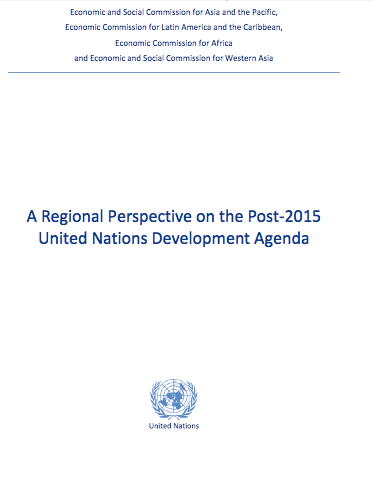The UN Regional Commissions released a joint publication, titled 'A Regional Perspective on the Post-2015 United Nations Development Agenda.' The report identifies priority areas for a global development agenda, assesses the implementation of the Millennium Development Goals (MDGs), discusses regional specificities and recommends adapting global goals to regional and national goals.
 June 2013: The UN Regional Commissions released a joint publication, titled ‘A Regional Perspective on the Post-2015 United Nations Development Agenda.’ The report identifies priority areas for a global development agenda, assesses the implementation of the Millennium Development Goals (MDGs), discusses regional specificities and recommends adapting global goals to regional and national goals.
June 2013: The UN Regional Commissions released a joint publication, titled ‘A Regional Perspective on the Post-2015 United Nations Development Agenda.’ The report identifies priority areas for a global development agenda, assesses the implementation of the Millennium Development Goals (MDGs), discusses regional specificities and recommends adapting global goals to regional and national goals.
The report provides an historical perspective on the MDG agenda, including its political origins and development paradigm, and highlights MDG strengths and weaknesses. The report then assesses MDG implementation at regional levels and from an inequality perspective. Using the MDG acceleration method to evaluate progress, it highlights three results: African countries made more progress than other countries, even if they do not achieve the MDGs; Least Developed Countries (LDCs) accelerated their progress faster than non-LDCs; and acceleration in progress has been uneven across goals. Further, while almost all Landlocked Developing Countries (LLDCs) maintained or accelerated their progress, none of the Small Island Developing States (SIDS) is among the top countries that accelerated their progress.
While noting commonalities among regions, the report calls for a nuanced approach that recognizes regional specificities and needs. It stresses how a country that misses a MDG target may still make substantial progress and argues that differences in initial conditions, or “starting-points”, should be considered when formulating development strategies. This chapter summarizes regional priorities on economic, environmental and social sustainability and governance and institutions. On environmental sustainability, the report emphasizes the impacts of climate change, including regional vulnerabilities, and recommends a better focus on sustainable management of biodiversity and ecosystem services.
The report concludes that the success of a global post-2015 agenda will depend on regional efforts to adapt globally agreed goals and priorities to national realities and argues for greater prioritization of regional efforts. It further argues for: prioritizing employment generation; tackling inequality; incorporating a comprehensive approach to environmental sustainability; and including democratic governance.
The Economic and Social Commission for Western Asia (ESCWA) coordinated the report in collaboration with Economic Commission for Europe (ECE), Economic and Social Commission for Asia and the Pacific (ESCAP), Economic Commission for Latin America and the Caribbean (ECLAC) and Economic Commission for Africa (ECA). The report is informed by: meetings and reports on the post-2015 agenda organized by the Regional Commissions; UN system-wide discussions on the post-2015 agenda; and the outcomes of the UN Conference on Sustainable Development (UNCSD, or Rio+20) Outcome Document. [Publication: A Regional Perspective on the Post-2015 United Nations Development Agenda]